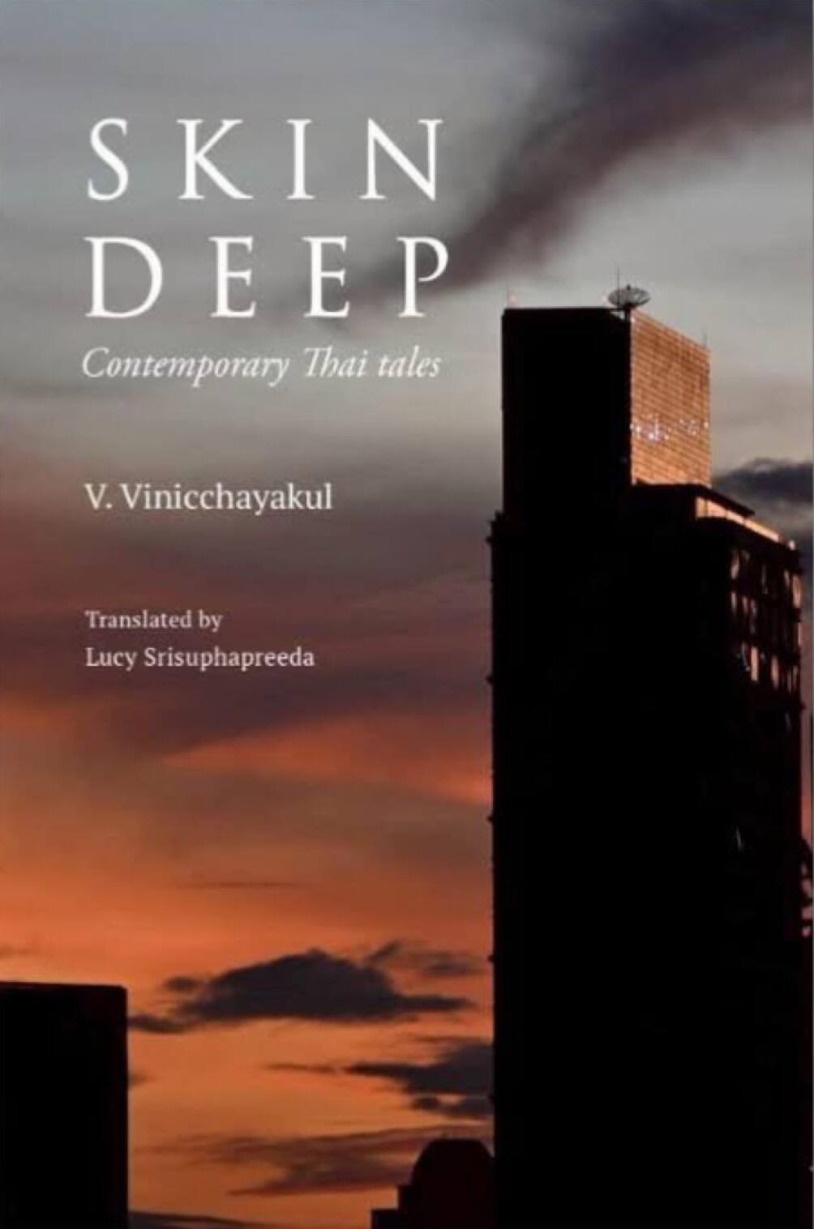V Vinicchayakul, the pen-name of Vinita Diteeyont, is prolific by any measure, reportedly with more than one hundred novels under her belt, many adapted for television and film. Only a very few have made it into English; had not she been championed by translator Lucy Srisuphapreeda, perhaps none would have been.
Skin Deep is a collection of five long stories, the longer of which—at some sixty pages—are arguably the novellas that Srisuphapreeda calls them in her preface. She calls them “parables” rather than stories, told, she says “from a uniquely Buddhist perspective” reflecting the hardly uniquely Buddhist perspective that “things are not always what they appear to be, and that everything is subject to change.
The five stories together display Vinicchayakul’s versatility as a writer.
The first of the five, “The Boy Who Had Everything”, is an Upstairs-Downstairs tale of two parallel lives from two social classes. The titular boy who had everything fecklessly lets it all dribble away, while the son of family servants finds stability in hard work and family.
“The Dream at the End” is a story of a life, a long one, with ups and downs—love and betrayal, a father who kept his secrets to himself, children who grow and find their own paths—one which ends with a moral:
I’ve never been a dreamer, but that’s also been my strength as I’ve always been able to take life as it comes. My life wasn’t perfect. Nobody’s is. But I took what I had and made the best of it. And, truly, it turned out better than I could have ever imagined.
The titular “Skin Deep” is about a young woman who is about to marry a man who she discovers is a (rather innocent) cross-dresser. The alternative, she finds, is worse.
While one can understand why Srisuphapreeda calls these “parables”—there are life lessons in these tales—and perhaps “tales” is more apt. These have little in the way of dramatic arc; in their matter-of-fact description of Thai life, they seem reminiscent of Thai writers of an earlier generation such as Pira Sudham or even Kukrit Pramoj. This passage from “Skin Deep” is illustrative:
Saran’s house was in a small street close to Victory Monument. It wasn’t fancy, but Nadee fell in love with it the moment she saw it.
She had always liked old wooden houses, so she immediately approved of the two-storey wooden house, which had recently been painted pale blue. It must have had wooden shutters for windows in the past, but now it had glass windowpanes. The sides of the house were covered in cement and edged with gravel and there was a large mango tree on the west side, which provided shade in the afternoons.
Saran showed her the house with pride, explaining, “I’m gradually renovating it. I can’t afford to do it all at once.”
Karma can sometimes work in mysterious ways.
“No Good Deed”, the shortest of the five, is also closest to a traditional short story in that it contains a twist: the missing word in the title is “unpunished”. A man’s stepping in to help a neighbour suffering domestic abuse results in a major and catastrophic fire, for which he is blamed and ostracized. Karma, in this case, would seem to work in mysterious ways.
The most interesting story is “The Prayer Across Lives”, not so much because it is better, but because it can be read either as an (Asian) ghost story or as magic-realism. Vinicchayakul’s slice-of-life approach to writing applies just as well to the gently supernatural as it does to quotidian.
The five stories together display Vinicchayakul’s versatility as a writer. Srisuphapreeda provides her with a voice in English that is straightforward and, even when the events themselves are distressing, soothing. She would no doubt call this “Thai”:
these stories offer profound reflections on Buddhist teachings of impermanence, compassion, karma, and detachment, and are told from a distinctly Thai cultural point of view …
Skin Deep won’t set the (literary) world on fire; one suspects, though, that it wasn’t meant to, that instead the stories are intended, as translator Srisuphapreeda, writes, to “offer a pause for reflection amid the busyness of everyday life.” That they do.

